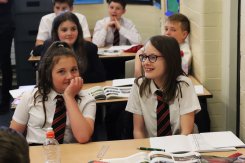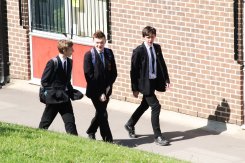Anti-bullying
What is bullying?
Bullying is a range of unacceptable behaviours that hurt, intimidate, frighten, harm, humiliate, undermine or exclude an individual or group. Bullying is deliberate and repeated over time, and is difficult for the sufferer to defend themselves against.
Anybody can be bullied because of how we look or where we are from, what we believe, what we have or don’t have, what we can or can’t do – picking on our vulnerability. It is always about someone more powerful acting against someone else who is less powerful and less able to resist.
Bullying is different from an argument or a fight. It is regular, systematic and deliberate, and an abuse of power. It can impact on learning and attendance and most importantly on children’s self-esteem and confidence. It can give the message that force and intimidation are the way to get what you want and become a pattern for future behaviour and relationships.
It can take a range of forms:
• Physical
• Verbal
• Emotional - being excluded from games with friends etc
• Damage to property or theft
• Intimidation through gesture and threat, both verbal and non-verbal
• Cyber –through a range of technologies – mobile phones, email and social networks
• Exclusion or non-communication
Bullying concerns all of us, not just those who are bullying and those being bullied: it also affects less assertive children who may be drawn in, and those who witness bullying and feel unable to do anything. Bullying can happen in secret and a child being bullied can feel unable to tell.
We take bullying very seriously as a school, across the whole community, and will not tolerate bullying in any form.
We follow up all concerns expressed by children, staff or parents and make sure that we feed back the results of any investigation. Sometimes what is seen as bullying is simply unacceptable behaviour and we address this differently.
We always encourage children to tell, making it clear that we take action when we know.
We act proactively to educate learners about positive relationships and how to resolve conflict:
• Using assemblies and discussion time in form time
• Making this an annual school focus in National Anti-Bullying Week
• Addressing the issues through the curriculum
• Adults on duty at lunch and break
• Encouraging people to talk, with a commitment to listening and responding to what we are told
• Making clear what you should do if you are being bullied and consequences of bullying behaviour If, we suspect bullying
• Talk to the children being bullied, the child suspected of bullying behaviour and any witnesses
• Offer help, support and counselling as appropriate for as long as necessary
• Discipline and support those involved in line with our behaviour policy
• Involve parents
• Involve the police if necessary
We record any incidents of suspected bullying and our actions and report any incidents of bullying reported termly to the Governing Body.






